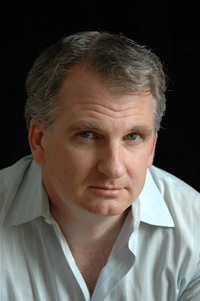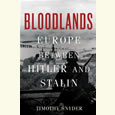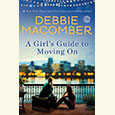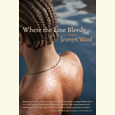Emotional Truths And Gonzo Premises
Kevin Wilson talks with Chapter 16 about what’s real—and what’s weird—in his short stories
The characters in Kevin Wilson’s debut story collection, Tunneling to the Center of the Earth, experience emotions that almost any reader would find both soothingly and troublingly familiar. They are men and women alone in the world, either by choice or unfortunate circumstance, and they are keenly aware of loss—that of parents, innocence, friendship. They flounder, they fight the spiral of depression, they worry over the what-ifs, and they seek solace in like-minded outsiders.
Two brothers struggle to keep the bubble level after their parents die suddenly—not in an expected way, like a car crash, but of spontaneous combustion—in “Blowing Up on the Spot.” In the title story, some college graduates dig a labyrinth of tunnels beneath their town and take up residence in those depths. And in “The Choir Director Affair,” the narrator babysits for a couple whose marriage is falling apart. Sounds believable enough, sure. But the infant in question has a full set of sharp teeth—hence the Big Macs his father buys him for lunch instead of pureed sweet potatoes.
Not all of Wilson’s stories traffic in outsized weirdness, however. In “Go, Fight, Win,” a teenage girl, pressured into joining the cheerleading squad by her mother, resists school cliques and instead becomes infatuated with a lonely younger boy who lives across the street and has a thing for playing with fire. It’s a deeply touching story, perhaps even more so for its lack of oddity among stories about exploding humans and college grads living (literally) subterranean lives.
These, and the other stories more firmly rooted in a recognizable world, are what Chapter 16’s Michael Ray Taylor liked best when he reviewed the book last year: “A wholly imagined, but physically impossible, undertaking may be just the sort of dazzle that makes a writer the star of a Tuesday afternoon fiction workshop, but it pales in comparison to the lyrical beauty he brings to his stories of odd, damaged people looking for their place in a confusing—but very real—world,” Taylor wrote. “Kevin Wilson’s great promise lies not in tunneling to the center of Earth, but right here on the surface, tunneling into the thick of humanity.” Other reviewers have taken warmly to the strange worlds Wilson creates, which seem of a piece with those imagined by other contemporary short-story writers such as George Saunders, Aimee Bender, and Kelly Link. Booklist reviewer Ray Olsen called it “wildly imaginative…[and] also warmly compassionate in tenor. [Wilson] creates an appealing voice for each first-person narrator he invents, and in third person, he is flat-out magisterial, with more than a hint of the magical. Watch him closely.”
Now Wilson is on the cusp of publishing a novel, The Family Fang, due out from Ecco this summer. Wilson, who helps run the Sewanee Writers’ Conference and teaches fiction writing at the University of the South, answered questions from Chapter 16 via email.
Chapter 16: For all their quirky trappings, there’s a very sober, lonely quality to most of the stories in your collection. The not-quite-real premises are always attached to emotional truth. What initially gets you more excited about a work in progress: a strange, alternate-reality premise, or the emotional realism of the characters?
 Wilson: The premise gets the ball rolling; it gives me a reason to start playing with the narrative, but my favorite thing is to place a character in that strange premise and see what happens. If the characters don’t matter to me, or if I can’t figure out a reason for them to interact with the strangeness around them, then the premise falls apart, which happens to me more often than not when I try to write a story. In the end, what I care about are the characters and the narratives are just my attempts to give them a story worthy of their own unique perspectives.
Wilson: The premise gets the ball rolling; it gives me a reason to start playing with the narrative, but my favorite thing is to place a character in that strange premise and see what happens. If the characters don’t matter to me, or if I can’t figure out a reason for them to interact with the strangeness around them, then the premise falls apart, which happens to me more often than not when I try to write a story. In the end, what I care about are the characters and the narratives are just my attempts to give them a story worthy of their own unique perspectives.
Chapter 16: What’s the connection, for you, between mood and writing?
Wilson: I fear that I’m misunderstanding the question, but I don’t know if I feel there’s a connection between mood and writing for me. My primary mood, 80 percent of the time, is one of anxiety. Writing, if it’s working, calms me somewhat, but I’m still trying not to explode.
Chapter 16: While the Internet has dealt staggering blows to publishing as we’ve known it, it has also provided fresh opportunities for young writers to establish themselves. What role do you think online publishing is going to have in keeping serious literature alive?
Wilson: Online publishing is something that seems crucial to the current state of literature. For me, the allure of online publishing goes beyond content and deals with the idea of creating communities for people who are interested in all kinds of literature. I first read Matt Bell’s stories online (he now has an amazing collection available from Keyhole Press out of Nashville) and loved them. And that led me to his blog, where I learned more about his own work, and he also mentioned work by writers I did not know and now have come to love. And Matt edits an online journal, The Collagist, that introduces me to even more writers that I might not have read if not for the initial ease of finding and following the work of one particular writer on the internet.
Chapter 16: What differences do you see between the young writers you teach today and the young writer you were at their age? Does teaching affect the way you write at all?
Wilson: My students seem more mature than I was at that age. They have read more than I had at that point.
Teaching improves my writing, or at least I tell myself that it does so as to justify the amount of time I put into it. Looking at raw, unfinished stories and finding a gem of a paragraph or a particularly amazing line or, best of all, a story that needs no revision at all, forces you to constantly be open to what can happen on the page, to allow for wonderment. When I’m working with a student who is making steady progression towards something wonderful, it feels great to be so close to the work, and it makes me want to write something equally exciting.
Chapter 16: Did any of these stories begin as writing exercises? If, so which ones, and how? Is there any particular exercise you’ve found very useful in developing work, or one that often goes over well with your students?
Wilson: A few of these stories began as general writing exercises because I wrote them for my undergraduate and graduate workshops. I wrote them because I had an idea that I wanted to explore, but the larger reason that I wrote them was that I had a deadline for the workshop and I didn’t want to embarrass myself in front of the class. Over the previous year, I had a monthly contest with a few of my friends where we would take turns choosing a single word (“Eggs” or “Tar” or “Sinkhole”) and we would each write a thousand-word story focusing on this word. Just having that slight obstruction forced me to play with the story in a way I wouldn’t have otherwise. It made me get weirder, which is always more fun.
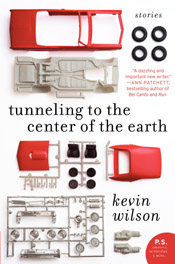 For my students, I like to have them write a thousand-word story, which can be very difficult for them because they want to write more. Then, once they turn it in, I have them take the story and cut 500 words out of it. It seems impossible to them, but sometimes it works out and they see how much extraneous stuff they had in the story. And so, when they work on ten or fifteen page stories, they think about concision and what they really need to make the story work.
For my students, I like to have them write a thousand-word story, which can be very difficult for them because they want to write more. Then, once they turn it in, I have them take the story and cut 500 words out of it. It seems impossible to them, but sometimes it works out and they see how much extraneous stuff they had in the story. And so, when they work on ten or fifteen page stories, they think about concision and what they really need to make the story work.
Chapter 16: In the extra material at the end of the book, there’s a piece called “The Stories Behind the Stories”—pairings of your work with previously published short stories. Did you explicitly have these stories in mind as you wrote yours, or did the connection come to you after the fact?
Wilson: In some of them, I explicitly had the story in mind when I was writing my own story. My story “The Shooting Man” was written a few days after reading Millhauser’s “The Knife Thrower,” and I wasn’t trying to do anything other than to rewrite Millhauser’s story in my own way. As for others, such as “Tunneling to the Center of the Earth,” I found the existing story by another writer after I was already writing my own story, and it helped me figure out what I was trying to do, how to reach the end of the narrative I was creating. I know a lot of writers that refuse to read anyone’s work when they’re deep into a project, but I find that I need that spark from other writers sometimes. Most of the stories that I write are because I’ve read a story or novel that I love and I can’t stop thinking about it, so I try to recreate it myself.
Chapter 16: Your wife, Leigh Ann Couch, is a poet. What differences do you see in the challenges facing poets and those you face as a fiction writer—or are the challenges more similar than ever?
Wilson: For the two of us, the challenges are the same and they are very basic. We struggle to find time to write. We struggle with the fear that we’re terrible writers. We struggle with the worry that no one will read anything we end up writing. Once we finish our manuscripts, the distribution methods for poetry and fiction may be vastly different, but those challenges are secondary to the challenge of making something good. Leigh Anne knows she’s not going to get a lucrative book contract or have a poem optioned for a feature film, but I know I’m not going to get those things either.
Chapter 16: How integral has a writing community—physical, online, or a combination of the two—been to your development as a writer? Do you share your work in progress with a group of fellow writers these days?
Wilson: I’ve worked as a staff member for the Sewanee Writers’ Conference for almost ten years and the people I’ve met as a result have helped me immensely, not in terms of finding an agent or getting published, but of meeting other writers who have become close friends and a support system for the weirdness of trying to write. Aside from those little thousand-word exercises, I don’t share my work with anyone. I feel like all of my friends are working on their own stories and poems and I just don’t like the idea of forcing them to deal with my stories when I don’t even know if they’re finished or even any good.
Chapter 16: The Family Fang, your first novel, will be published later this year. Tell us a little bit about it. What does it have in common with your shorter work?
Wilson: The Family Fang is about a strange family of performance artists. The parents have basically forced their children to take part in their artistic projects and that has, understandably, messed up the kids. The children are now adults and not succeeding in their own lives, and circumstances force them to return to their parents. And then things get worse for them. In comparing it to my short stories, I think the quirkiness of the characters is similar, but this novel doesn’t have the fantastical elements of the stories. The people are strange in this novel, but the world in which they exist is our world.
Kevin Wilson will read from his work at the University of Tennessee in Knoxville on February 14 at 7 p.m. in the Hodges Library Auditorium. The event is free and open to the public.
